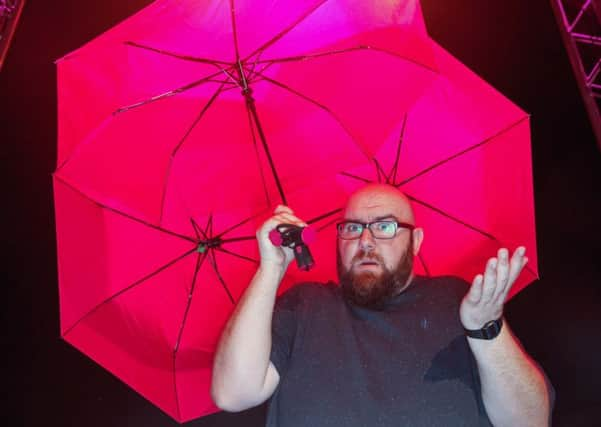Interview: Scott Gibson on finding the funny in his difficult relationship with his father


Scott Gibson seldom thinks of his cranial scar, even if it’s an ever-present reminder of the brain aneurysm he suffered eight years ago. But the Glaswegian does recall being turned away from a Bath Street cocktail bar three months after his life-saving surgery because his face didn’t fit. Still, he’s sanguine. His brush with mortality galvanised him into becoming a stand-up and inspired the show Life After Death, which won the 32-year-old the best newcomer award at last year’s Edinburgh Fringe.
A more meritocratic business than most, comedy has nevertheless skewed towards younger, more telegenic acts in recent years, at least in broadcasting, with knock-on effects for live ticket sales. Sitting in a pub in Glasgow’s West End, neglecting his sandwich and fries, Gibson is, in his own estimation, “just a normal-looking bloke… skinny jeans-wearing on BBC Three, that’s not me”. Despite being a well-liked figure on the Scottish circuit and a support act for Frankie Boyle, he was largely ignored by the industry, overlooked by the media and never truly felt himself a proper comic until his acclaimed Fringe debut.
Advertisement
Hide AdPlenty of English comedy clubs were “a door I was chapping on for 18 months” he explains. “I couldn’t even get someone to shout ‘go away!’ A total wall.” Then after the Edinburgh nomination, suddenly “loads of business cards appeared from nowhere, people asking to speak to me. I was overwhelmed. They hadn’t seen me. I could have been the most racist comic in the world for all they knew.”
About to embark on a UK mini-tour, with newly installed management from Edinburgh’s Gilded Balloon and a recording of Life After Death being released by US label Comedy Dynamics (making him, along with fellow Scot Fern Brady, the second British act on a roster that includes such luminaries as Louis CK, Bill Hicks and Doug Stanhope), he’s enthused by the possibilities opening up for him. A Radio 4 adaptation is in development, he’s writing a sitcom about a bowling club and is touting for gigs in America.
“I feel as though comedy is changing in the last year,” he surmises. “Like it’s moving away from the beautiful people and back to a game for people who think and see the world differently.”
He always knew his near-death experience would be his first show. And its follow-up, Like Father Like Son, is a story he also needed to tell, regardless of the emotional wounds it opens. Engaged and contemplating starting a family, Gibson can’t suppress his anger at having to care for his critically ill father, lately returned to Scotland after a stroke having lived in America for virtually the entirety of his adult life. Strikingly similar to his father physically, he credits him as being the source of his sense of humour. But he also fears that he’s inherited the “short fuse, coldness and selfishness, where he’s the most important person in his life.”
Acknowledging his father’s own unhappy relationship with his grandfather in the show, Gibson worries “that I’ve been selfish with some of the decisions I’ve made in my career, how that’s affected my relationship with my fiancée. I see him in his sixties, divorced three times, alone and ill, because he never looked after himself. All this shit between us and there’s so much resentment there.”
A warm and engaging compere when hosting club gigs, it’s grimly compelling to hear such an affable performer sharing his ugliest thoughts. The likes of Russell Kane, Des Bishop and Jason Cook were all vastly more experienced stand-ups when they tackled their celebrated “dead dad” shows. And in the main, they retained greater affection for the old block they were chipping at.
Advertisement
Hide Ad“I don’t want people to leave the show thinking ‘he’s an amazing son, he’s looked after his father’,” Gibson explains. “Because I’m not and that’ll become apparent. They can have mixed emotions but there’s not going to be a happy ending. The man is ill and it’s very difficult. I don’t know how it’s going to continue. I don’t know if I want it to continue. But I can’t leave it.”
His father knows he’s doing the show “but I don’t think he’s fully aware what it’s about. Strangely, it’s easier for me to go on stage and talk about it than talk to him. Maybe it’s a coward’s way. But I don’t know what would come from having that conversation. I don’t know how much he could take in anyway.
Advertisement
Hide Ad“I’ve never had that controlling switch to say I can’t speak about anything. I know when my mum came to see my last show, some things would have really upset her. But this is how I feel. And right now, I’m looking at the two men in my life who directly or indirectly are the biggest influence on the man I’ve become.”
Due to marry in January, after his recent run of London shows forced them to postpone from the start of this year, he explains that his mother is also a triple-divorcee and “that marriages don’t really hold true in my mind.
“I’m not a very good boyfriend,” he states baldly. “I’m not a great son. I’m a rubbish brother and the worst uncle there is. But it’s important when you’ve got an hour to really give a bit of yourself. Flawed is funny.”
*Scott Gibson: Like Father Like Son is at the Tron Theatre, Glasgow, on 12 March, as part of the Glasgow International Comedy Festival. He tours his Life After Death show to Scottish Storytelling Centre, Edinburgh, 20 April; the Byre Theatre, St Andrews, 21 April; The Lemon Tree, Aberdeen, 22 April; Kilted Kangaroo, Stirling, 23 April; and Paisley Arts Centre, 27 April, www.scottgibsoncomedy.co.uk